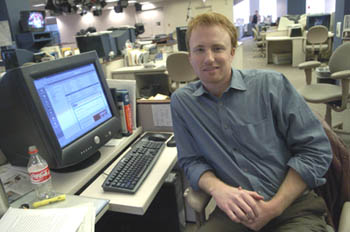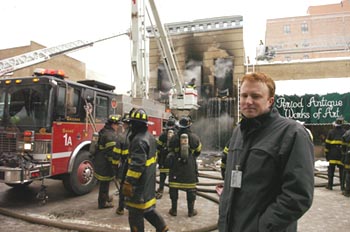|
|

| October 16, 2006 From Belfast to Havana to Chicago to Washington, Patrick Rucker, '96, Brings Home the News Patrick Rucker may not have had a clear career path in mind when he graduated in 1996, but he had the confidence and adventurous spirit to follow wherever curiosity led him. It has led him far in the last decade, with a first stop in Belfast, Northern Ireland. Rucker became fascinated with the conflict between Catholics and Protestants during a trip he made to Northern Ireland as a high school student, he said. When he returned to Northern Ireland following his college graduation, he spent a year working in Belfast for the Alliance Party, a moderate, cross-community political party that represented both Protestants and Catholics. During this time he wrote a few pieces for the Alliance Party and discovered his love of writing. When Rucker returned to the United States, he wrote several stories for regional newspapers before moving to Richmond in the fall of 1997 to work as a paralegal for a local law firm. He contemplated applying to law school, but he continued to experiment with his writing and felt encouraged by the successful publication of several of his articles. This gave him the confidence he needed to return to Belfast in the fall of 1998 to try to make it as a freelance writer. Rucker, a leadership studies major and philosophy minor, had never taken a journalism class. "But I was 23 years old," Rucker said, "and I figured how far could I fall?" His gamble paid off. Some of his articles appeared in well-known newspapers and magazines, including The Boston Globe, The New York Daily News and Newsweek. In addition to writing news stories, Rucker spent much of his time researching and writing "This Troubled Land: Voices from Northern Ireland on the Front Lines of Peace," published by Ballantine Books in 2002. Rucker described the book as a collection of narratives about people who were putting their lives back together after the signing of the 1998 Good Friday peace accords. At the end of three years, Rucker returned to the United States. "What am I going to do now, I asked myself" Rucker said. "[Prospective employers] said it's nice that you've written a book, but we need 400 words by 5:00 p.m. today." Then Rucker got a break. He talked to a friend who worked for the British newspaper Financial Times and learned that the Cuban government had just deported the paper's Havana correspondent. Rucker applied for the position and soon found himself on a plane headed for Cuba. Again, Rucker's confidence and sense of adventure proved to be great assets. Although not fluent in Spanish-he had studied it for two semesters at University of Richmond-he never doubted that he could pick it up quickly and easily. He started each day with a Spanish tutor and soon became comfortable with the language. Rucker described Cuba as a beautiful country and a wonderful experience from a journalistic standpoint. "When I first arrived in Cuba there was talk of more openness," Rucker said, "but then Castro put a lot of political dissidents in prison. "I got to know many of the dissidents. They weren't having their fingernails pulled out, but they were in prison nonetheless." Maybe he got to know the dissidents too well. For whatever reason, his visa was not renewed at the end of the year, and Rucker headed back to the United States in the spring of 2003. A few months later he landed a job with the Chicago Tribune covering the city news. Rucker enjoyed the challenges of this new opportunity. "I saw things and places in Chicago that people who have lived there 50 years have never seen," he said. "It was like being in a foreign bureau." Most recently Rucker began reporting for the international, multimedia news agency Reuters in Washington, D.C. He covers the housing market, including regulatory issues, regular updates on large mortgage companies like Fannie Mae and Freddie Mac, trends in the industry and the overall health of the industry. Although as a college student he may not have guessed that he would become a journalist, Rucker has nevertheless excelled in his profession. "I love digging up a story and then telling it in a compassionate way," Rucker said. The intellectual environment generated by the students and faculty at Jepson helped prepare him and his classmates for whatever profession they chose, Rucker said. "Jepson was all about learning how to think better and stronger and then applying that thinking to whatever we decided to pursue," he said. |

